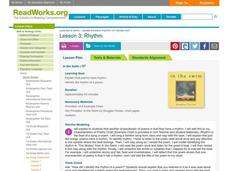Curated OER
Animal Classification
Third graders differentiate between vertebrates and invertebrates, and identify the main characteristics of mammals, fish, reptiles, amphibians, and birds. They sort and categorize different types of balls, discuss the characteristics...
Curated OER
Biology In Elementary Schools
Students classify animals into six major animal groups and describe the characteristics of the animals found within each group. In this living and non-living animals lesson, students observe a variety of animals, both living and...
Curated OER
What Kind of Animal Are You?
With the descriptions of six different animal groups (amphibians, birds, fish, insects, mammals, reptiles), learners match different examples of animals to their proper groups (lizard to reptiles, girl to mammals, etc). The activity...
Curated OER
Dogs
In this instructional activity about dogs, students fill in the blanks with adjectives, answer reading comprehension questions, and tell characteristics of special dogs. Students write ten answers.
Curated OER
Something's Fishy
Students study fish habits and traits. In this marine life lesson, students complete four learning centers of a fish memory game, a fish habitat study, draw and glue fish craft activity, and a fish read-a-thon. Students complete their...
Curated OER
Classification of Animals
This is one of the better presentations I've seen on the classification of animals. Youngsters view slides that introduce the characteristics of each of the animals groups through the use of photographs and text. Then, they are given...
Curated OER
Rhythm
One of the most fun characteristics of a poem is rhythm! Little ones will clap along as you read a poem, to determine the rhythm of the piece. The book In the Swim is used throughout the lesson; it contains fish themed poems that kids...
Curated OER
What Does it Take to be a Survivor? Part One
Students explore marine animal adaptation. In this introductory ocean life biology lesson, students access prior knowledge by participating in a whole class "thought swap." Students form two lines, respond to a prompt from the teacher...
Biology Junction
Cnidarians
In this cnidarian worksheet, learners study the biology of the different species of cnidarians and complete a series of questions.
Curated OER
Plants and Animals
Students find common needs between plants and animals. In this plants and animals instructional activity students compare that both plants and animals need food and water. They also find the differences between plant and animal needs.
Curated OER
Conditions at Sea Data Activity
Students study how to forecast sea conditions. In this oceanography lesson students complete a class activity on wave making.
Curated OER
Animals Galore
A well-designed lesson which covers the characteristics of the animals found in the six animal groups is here for your young biologists. In it, learners divide up into six groups; the amphibians, reptiles, mammals, birds, fish, and...
NOAA
Fishy Deep-sea Designs!
Oceans represent more than 80 percent of all habitats, yet we know less about them than most other habitats on the planet. The instructor introduces the epipelagic, mesopelagic, bathypelagic, twilight, and midnight zones in the ocean....
Curated OER
What's The World Made Of?
Second graders identify the three states of matter by examining fishbowls with various contents. They discuss their observations and the characteristics of matter in each state. Pupils read the story The Rainbow Fish and look for...
Biology Junction
Cnidarians and Ctenophorans
Cnidaria is a broad phylum of 11,000 different species from jellyfish to coral. Most Cnidarians are marine species with a few freshwater examples. A lesson presentation explains the important characteristics of different species of...
Curated OER
Habitat Assessment
Third graders demonstrate the effects of varying environmental components on plants and animals: chemical, physical and biological characteristics of a habitat. They find chemical, physical and biological characteristics of the lake at...
Curated OER
Ocean Impacts of an El Nino Event
Students study sea surface height and temperature and other characteristics of an El Nino. In this ocean impacts lesson students examine the factors that influence an El Nino or La Nina.
Curated OER
Fun with Fictitious Animals
How can one differentiate between a dweezlebub and nessie? Use this fictitious creature dichotomous key to find out! Biologists of all ages will enjoy this creative way to learn about classification, including a chance to draw the...
Curated OER
Wetland Metaphors
Young scholars describe the characteristics of wetlands and identify their ecological functions. They inspect items and use them to create metaphors about wetlands.
Curated OER
The Geography of Japan
A comprehensive look at Japan and its characteristics will engage and inform the viewer about one of the most prominent powers in the world today. The demographics, topography, and climate of Japan are covered in these slides with maps,...
Curated OER
Blue Crabs - The Blue Crab's Chesapeake Journey
A plethora of information about the blue crabs of Chesapeake Bay will amaze and delight your marine biologists. They learn, through direct instruction, about the characteristics and life cycle of this fascinating arthropod. A highlight...
American Museum of Natural History
Ocean Creature Feature
From coloring to hard protective shells, ocean creatures have adaptation features that help them survive. An eight-question online quiz highlights different ocean animals and their unique characteristics. The resource then offers pop-up...
American Museum of Natural History
What's This? Leeches
Who actually likes leeches? Meet a scientist that makes his living letting leeches feed on him. Pupils learn about the characteristics of leeches and different variations of the species. The lesson works as a remote learning resource or...
Curated OER
Something Fishy
Students identify and discuss the adaptive characteristics and behaviors of fish. They view slides of fish, and design and create a model of a fish of the future, listing the ways their fish adapt to survive.

























